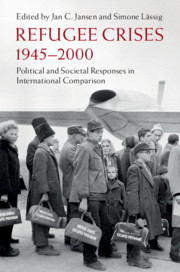Book contents
- Refugee Crises, 1945–2000
- Publications of the German Historical Institute
- Refugee Crises, 1945–2000
- Copyright page
- Contents
- Contributors
- Acknowledgments
- 1 Responses to Refugee Crises in International Comparison
- Part I The Postwar and Decolonization Moment
- Part II Refugee Movements during the Cold War and beyond
- 7 The 1956–1957 Hungarian Refugee Crisis and the Role of the Canadian Press in Opening the Doors to Asylum Seekers
- 8 Responding to and Resettling the Vietnamese Boat People
- 9 US State and Civil Society Responses to Salvadoran Refugees, 1980–1991
- 10 The Plight of the First Post–Cold War Refugees
- 11 Rwandan Refugees in Tanzania, 1994–1996
- Part III Afterword
- Index
11 - Rwandan Refugees in Tanzania, 1994–1996
from Part II - Refugee Movements during the Cold War and beyond
Published online by Cambridge University Press: 13 October 2023
- Refugee Crises, 1945–2000
- Publications of the German Historical Institute
- Refugee Crises, 1945–2000
- Copyright page
- Contents
- Contributors
- Acknowledgments
- 1 Responses to Refugee Crises in International Comparison
- Part I The Postwar and Decolonization Moment
- Part II Refugee Movements during the Cold War and beyond
- 7 The 1956–1957 Hungarian Refugee Crisis and the Role of the Canadian Press in Opening the Doors to Asylum Seekers
- 8 Responding to and Resettling the Vietnamese Boat People
- 9 US State and Civil Society Responses to Salvadoran Refugees, 1980–1991
- 10 The Plight of the First Post–Cold War Refugees
- 11 Rwandan Refugees in Tanzania, 1994–1996
- Part III Afterword
- Index
Summary
Beginning in April 1994, following one of the most rapid refugee influxes ever recorded, the transnational humanitarian industry descended upon Ngara, a quiet district located on the Tanzanian edge of the Tanzania-Rwanda border. Overnight, Ngara became the center for a humanitarian complex that sought to aid and confine more than half a million Rwandan refugees, including both victims and perpetrators of the Rwandan genocide.Based on archival research and over 100 interviews in Ngara, this essay explores Ngaran lived realities during the time that they became neighbors, victims, and entrepreneurs within a violent refugee context. The author argues that the refugee complex in Ngara, which included both refugees and expatriate aid workers, created a space of contradictory violence: a violence that was simultaneously disruptive and productive. Ngarans experienced the material and psychological harms of dislocation and physical violence associated with the refugee camps. Many also took advantage of novel economic opportunities created by the transnational refugee complex and the refugee population. This chapter demonstrates the paradoxical nature of refugee crises, and the lasting impact of this encounter on the lives and livelihoods of the Ngaran population.
Keywords
- Type
- Chapter
- Information
- Refugee Crises, 1945-2000Political and Societal Responses in International Comparison, pp. 260 - 282Publisher: Cambridge University PressPrint publication year: 2020



